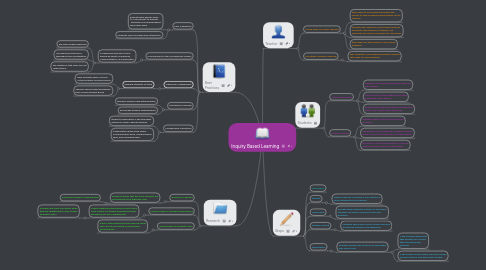
1. Steps
1.1. Class starts
1.2. Starting
1.2.1. When a new unit is started, a mini-lecture or some introduction is necessary.
1.3. Group work
1.3.1. On days when everyone is stuck on a problem, students can work in groups to solve the problems.
1.4. Problem Solving
1.4.1. Students spend time mosyt of the class time solving the problems and explaining.
1.5. Presentation
1.5.1. Students present the solutions of using what they have found.
1.5.1.1. If the students agree that they answers are correct then the next group presents.
1.5.1.2. If the answer is not correct, the class comes up with a plan to find the correct answer.
2. Best Practices
2.1. Peer Interaction
2.1.1. Keep student groups small (2-3 per group) to prevent students from hiding behind their peers work.
2.1.2. Students learn through social interaction.
2.2. Commitment to the Constuctivist Thoery
2.2.1. A significant amount of time should be spent on planning, implementation, and evaluation.
2.2.1.1. Ask open ended questions
2.2.1.2. Use questions that recur throughout the investigation.
2.2.1.3. Ask questions that have real-life applications.
2.3. Classroom Management
2.3.1. Keeping students on track
2.3.1.1. Have students keep a journal of the problem-solving process.
2.3.1.2. Teacher should make themselves part of each student group
2.4. Anticipitory Planning
2.4.1. teachers should make detailed plans.
2.4.2. Encourage student independence
2.5. Collaborative Instruction
2.5.1. Student collaboration is the strongest method in inquiry-based teaching.
2.5.2. Collaboration helps build verbal communication skills, compromising skills, and companionship.
3. Research
3.1. Amount of Learning
3.1.1. Research shows that the more students are involved the more that they learn.
3.1.1.1. Involvment leads to understanding
3.2. Positve impact on student achievement
3.2.1. Inquiry-based practices were found to have more impact on student achievement than background or prior achievement.
3.2.1.1. Students are more successful when they are taught how to learn as well as what to learn.
3.3. Improvement on students' skills
3.3.1. Inquiry-based practices help improve social skills, group processing, and individual accountability.
4. Students
4.1. Students-centered
4.1.1. Teachers are guiding as students search for the answers.
4.1.2. The interests of the students should be addressed in the lessons.
4.1.3. Students build their self esteem by having an active role in their learning process.
4.2. Problem-Solving
4.2.1. Students spend time solving real world problems.
4.2.2. The problems are presented in question format, and it is up to the students to find the answers.
4.2.3. At times it is up to the students to come up with the question and find the answers.
5. Teacher
5.1. Makes plans for inquiry learning
5.1.1. plans ways to encourage and enable the learner to take increasing responsibility for his learning
5.1.2. prepares the classroom environment with the necessary learning tools, materials, and resources for active involvement of the learner
5.1.3. plans ways for each learner to be actively engaged
5.2. Facilitates classroom learning
5.2.1. asks questions, encouraging divergent thinking that leads to more questions
